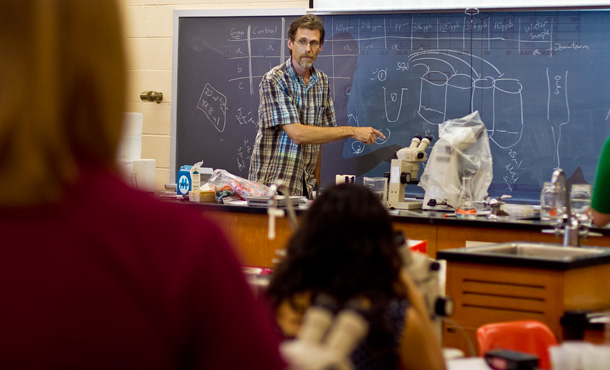Science, Technology, Engineering and Mathematics (STEM) majors are an active community of learners on our campus.
Seen a student in a Royals blue STEM sweatshirt lately? Ask what he or she is working on – you’ll be surprised by the meaningful and high-tech research STEM students are completing side-by-side with profs who are experts in their fields.
Come hear these STEM students present research findings on Friday, December 10, 2010, in SC104 at 3:40 p.m.:
Optimal Growth Conditions Across Organic Blueberry Cultivars and Soil Treatments
 Denay Fuglie and Braydon Hoover examined optimal growing conditions and parameters across five separate cultivars (Jersey, Bluecrop, Duke, Chandler, and Bluegold) and four different soil treatments (Horse Manure, Sheep Manure, Pine Straw, and Planter’s Choice Compost) at Knoll Acres Organic Blueberry Farm in Harrisonburg, Virginia. Data derived from in-field anatomical measurements throughout the spring, summer, and fall months were statistically analyzed through SPSS ANOVA.
Denay Fuglie and Braydon Hoover examined optimal growing conditions and parameters across five separate cultivars (Jersey, Bluecrop, Duke, Chandler, and Bluegold) and four different soil treatments (Horse Manure, Sheep Manure, Pine Straw, and Planter’s Choice Compost) at Knoll Acres Organic Blueberry Farm in Harrisonburg, Virginia. Data derived from in-field anatomical measurements throughout the spring, summer, and fall months were statistically analyzed through SPSS ANOVA.
About the student presenters
Braydon P. Hoover is a senior biology/pre-med major with minors in theater and psychology hailing from Elizabethtown, Pa. Denay Fuglie is a senior biology/pre-med major and music minor born and raised in Saudi Arabia. Both are officers of the Pre-Professional Health Society here at EMU and plan on attending medical school after graduation. They took an interest in Dr. Miller’s organic blueberry research due to their extreme love of blueberries and became involved in the project in the summer of 2010.
Mechanisms of Remyelination in a Murine Model of Multiple Sclerosis
 Charise Garber‘s research focused on Multiple Sclerosis, a neurodegenerative autoimmune disease that is characterized by demyelination of the axons in the central nervous system (CNS). In many cases of multiple sclerosis, periods of demyelination are followed by recovery periods of remyelination. Understanding the process of remyelination, and why it fails, is therefore very important in developing therapies to ease the symptoms of this disease. Charise’s research in summer 2010 focused on the role of several chemokines in mediating remyelination in a mouse model of multiple sclerosis.
Charise Garber‘s research focused on Multiple Sclerosis, a neurodegenerative autoimmune disease that is characterized by demyelination of the axons in the central nervous system (CNS). In many cases of multiple sclerosis, periods of demyelination are followed by recovery periods of remyelination. Understanding the process of remyelination, and why it fails, is therefore very important in developing therapies to ease the symptoms of this disease. Charise’s research in summer 2010 focused on the role of several chemokines in mediating remyelination in a mouse model of multiple sclerosis.
About the student presenter
Charise Garber is a junior biology/pre-med and music (interdisciplinary studies) major with interests in biomedical research and international medicine. She spent summer 2010 in a research lab at Washington University in St. Louis exploring several signaling molecules and their role in remyelination.
Isolation of Praying Mantis Oothecal Proteins
 Brianna Oelschlager (under the direction of Dr. Rajeev Vaidyanathan) focused her research on isolation of proteins to further anti-microbial work. The female praying mantis surrounds her eggs with a foam-like substance called an ootheca, which is likely composed of proteins with water-repellent, thermostable, and bacterial static properties. Previous work has identified specific plasmin-like proteases from the mantis egg casing , but the anti-microbial properties of mantis oothecal proteins have yet to be explored. Briann’s study outlines a protocol to isolate and characterize T. sinensis oothecal proteins in preparation for bioassays and LC-MS/MS to design primers to synthesize recombinant protein for use in anti-microbial bioassays.
Brianna Oelschlager (under the direction of Dr. Rajeev Vaidyanathan) focused her research on isolation of proteins to further anti-microbial work. The female praying mantis surrounds her eggs with a foam-like substance called an ootheca, which is likely composed of proteins with water-repellent, thermostable, and bacterial static properties. Previous work has identified specific plasmin-like proteases from the mantis egg casing , but the anti-microbial properties of mantis oothecal proteins have yet to be explored. Briann’s study outlines a protocol to isolate and characterize T. sinensis oothecal proteins in preparation for bioassays and LC-MS/MS to design primers to synthesize recombinant protein for use in anti-microbial bioassays.
About the student presenter
Brianna Oelschlager is a senior biochemistry major with a socio-economic development minor. She interned in 2010 at SRI International Center for Advanced Drug Research in Harrisonburg. Brianna worked as a student research associate on a project combining the fields of entomology and protein biochemistry. Brianna continued her work at SRI throughout the fall 2010 semester and plans on beginning medical school after graduation.
CNS Delivery of a Proteasome Inhibitor as a Therapy for Spinal Muscular Atrophy
 Jonathan Nofziger‘s research focused on spinal muscular atrophy, a recessive degenerative neuromuscular disease caused by a deficiency in the full length survival motor neuron protein. Jonathan’s research explored one possible avenue of treatment: proteasome inhibitors in combination with p-glycoprotein inhibitors.
Jonathan Nofziger‘s research focused on spinal muscular atrophy, a recessive degenerative neuromuscular disease caused by a deficiency in the full length survival motor neuron protein. Jonathan’s research explored one possible avenue of treatment: proteasome inhibitors in combination with p-glycoprotein inhibitors.
About the student presenter
Jonathan Nofziger is a senior biochemistry major from Stevens, Pa. He conducted his research at the National Institues of Health (NIH) National Institutes of Neurological Disorders and Stroke (NINDS) Neurological Genetics Branch (NGB). The Bethesda, Maryland, location of the NIH was accessible to Jonathan during his semester at EMU’s Washington Community Scholars Center. In his free time Jonathan plays French horn, takes photos and is a lighting designer.
